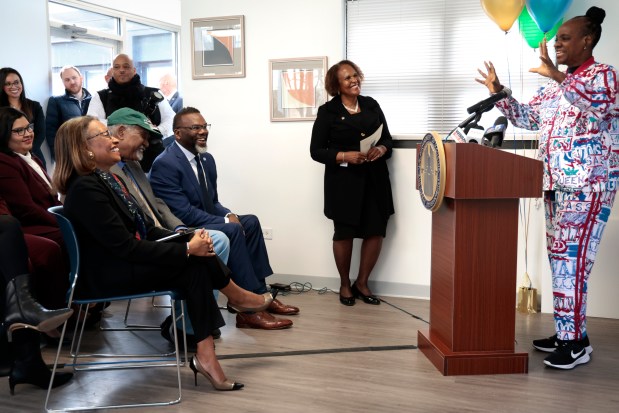Becoming the latest White House Cabinet member to visit Chicago as President Joe Biden gears up for a heated reelection campaign, the acting secretary for Housing and Urban Development announced a “historic” nationwide investment Thursday in green energy for low-income and affordable housing.
In her first public appearance since former HUD Secretary Marcia Fudge resigned Friday, Adrianne Todman talked up the Biden-Harris administration’s push for affordable housing and said the green energy initiative underscored the administration’s commitment to environmental justice.
“That the president spoke about the need for affordable housing, and who needs that affordable housing, was a big moment,” Todman said while invoking Biden’s fiery State of the Union address this month. “Look folks, this is environmental justice in action. This is the Biden-Harris administration in action.”
Todman’s Chicago visit came two months after Treasury Secretary Janet Yellen visited Chicago to tout “Bidenomics” during an address before the Economic Club of Chicago.
The Democratic president has made the Midwest a key focal point in his bid for a second term against likely Republican nominee Donald Trump, with the party picking deep-blue Chicago as the location of the Democratic National Convention this summer.
Todman made her remarks while she was joined by Mayor Brandon Johnson and Democratic U.S. Rep. Danny Davis to tour the Archer Courts building in Chinatown, a senior and family Section 8 complex receiving $11.76 million in federal funds for green energy fixes.
As a result of Biden’s Inflation Reduction Act, HUD’s Green and Resilient Retrofit Program will distribute another $173.8 million across America as part of the president’s initiative to retrofit homes in polluted neighborhoods, according to HUD. That brings the program’s total up to $544 million, allowing for building renovations to reduce carbon emissions and protect against extreme climate.
Besides the Archer Courts complex, the Preservation of Affordable Housing’s Austin Renaissance apartments got another $5.68 million. Other awardees outside Chicago were in Colorado, Florida, Mississippi, North Carolina, North Dakota, Oregon and Washington.
Johnson greeted the newest Biden Cabinet official with full-throated support, asking attendees, “Doesn’t it feel good, Chicago, to actually have an administration like the Biden-Harris administration that actually believes in investing in people?”
The mayor noted the $17 million sum for Chicago comes ahead of Martin Luther King Jr.’s death anniversary on April 4.
“As we prepare to celebrate one of the most remarkable human beings in the planet, it’s appropriate that this green and resilient retrofit program is here to provide a deep impact for Archer Square and of course the Chinatown community,” Johnson said. “This community is rich and vibrant, but it’s also one of the many communities in our city that has been severely impacted negatively by climate change.”
In an interview with the Tribune, Todman acknowledged that sharp demand for new affordable housing remains when asked about the March primary failure of Johnson’s Bring Chicago Home tax referendum, which he had pitched as a direly needed revenue source to address homelessness. But the acting secretary said Thursday’s announcement does not mean the Biden administration is prioritizing green energy over erecting new units.
“Not only do we need to build new housing and housing for renters, housing for first-time homeowners, but we have to preserve what we have,” Todman said. “So I don’t think it’s an ‘either or.’ It is an ‘and,’ and that’s important because if we begin to lose units, then we’re only going backwards.”
Todman noted the White House has spearheaded a $3.1 billion investment to fight homelessness across the U.S., and that the prevalence of pollution and other chemical hazards in Black and Latino communities makes environmental justice a key component of affordable housing, too.
As to why the Democrats couldn’t get the job done earlier, Todman noted, “We got our part done. Congress didn’t do what it needed to do,” referring to Republicans blocking the Build Back Better bill rolled out by the White House in 2021.




